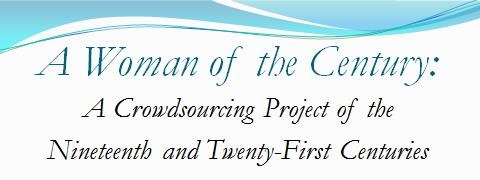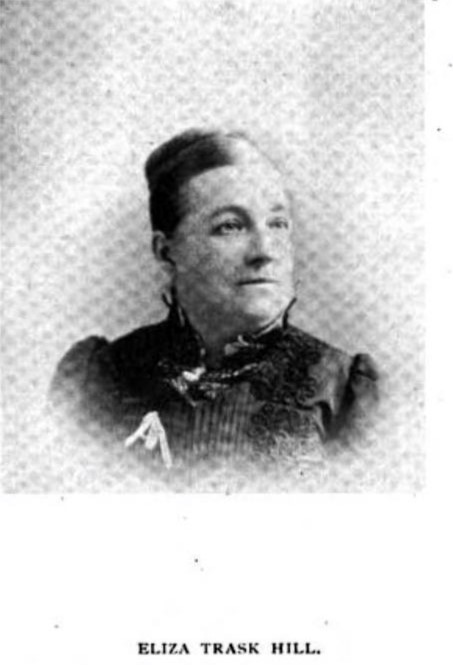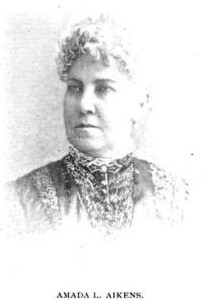May 7 - May 13
Women of the Week
Eliza Trask Hill, a woman suffragist and journalist from Warren, Massachusetts, and Amanda L. Aikens, an editor and philanthropist from North Adams, Massachusetts, had birthdays this week.
-
To learn about them by viewing their items, please click on their images.
-
To read their biographical sketches in A Woman of the Century, please click on the highlighted page number(s) to the left of their images.
Eliza Trask Hill, a native of Warren, Massachusetts, was born on May 10, 1840. Her profile lists her as a woman suffragist and journalist, but she also was a wife, a mother, a teacher, and a supporter of several different causes.
With a father and grandfather who were ministers and parents who were both active in reform efforts, Eliza was raised in an atmosphere with people who gave back to their communities. She followed their lead early in her life, presenting a flag to the Fifteenth Regiment of Massachusetts and speaking at that event. She also taught for ten years, including time teaching in Pittsburgh, beginning a career of passionate engagement with education. Eliza married John Lange Hill in 1866 and became a mother to three children.
Despite her domestic responsibilities, Eliza found time to toil for the many causes she believed in. As her A Woman of the Century profile explains, Eliza "labored earnestly for the redemption of abandoned women, but, believing that preventive is more effectual than reformatory work, she has identified herself with the societies that care for and help the working girls" (380). An 1887 article in the St. Johnsbury Caledonian discussed how she and Ellen M. H. Richards led the New England Helping-Hand Society's efforts to establish a home for working women in Boston.
Eliza also contributed as a public speaker, an early member of the Woman's Christian Temperance Union (especially its committee on prison reform), a political activist, and a member of the Prohibition Party.
An ardent advocate of public education, Eliza was the founder and editor of Woman's Voice and Public School Champion. She was elected to membership in the New England Woman's Press Association in 1890. The next September, Eliza joined Julia Ward Howe, Mary A. Livermore, and Susan S. Fessenden on the speaking platform at Tremont Temple for a rally related to the upcoming school committee election.
Eliza also continued to advocate for reforms. In late November of 1898, The Indianapolis Journal announced her upcoming talk, "Glimpses of Prison Life." Two days later, the newspaper published a lengthy review of her speech, an article that reveals Eliza's style of combining logos and pathos, sharing statistics while also touching audiences with emotional stories of individuals whose lives led them to crime.
She passed away at her home in Somerville, Massachusetts, on March 29, 1908, and was buried in Laurel Hill Cemetery in Fitchburg, Massachusetts.
Amanda L. Aikens was born in North Adams, Massachusetts, on May 12, 1833, and later lived in Pittsfield. She met Andrew J. Aikens, editor of a weekly North Adams newspaper, and the couple moved to Milwaukee, Wisconsin after their 1854 marriage. Amanda devoted her life to raising their three daughters, editing the "Woman's World" department of the Evening Wisconsin, her husband's paper, and participating in numerous activities.
A member of the Association for the Advancement of Women, Amanda was a strong advocate for women's education. In 1876, she took two of their daughters to Europe. As The Lake County Star noted, "They sail to Europe, and will remain abroad some time, Mrs. Aikens intending to educate her daughters, giving them the full benefit of French and German study." Eight years later, she made another trip there with Stella and Minnie, since Minnie was going to be attending school in Paris. The St. Paul Daily Globe reported that Amanda would "remain with her while she is receiving her education."
Interested in educating all women, Amanda was involved with the establishment of the Wisconsin Industrial School for Girls, later serving as its vice president. She also supported the Johns Hopkins Medical School to ensure that it would accept female students.
Amanda's profile in A Woman of the Century goes into detail about her work with another women's organization:
"She has been identified for fifteen years as an officer or director with the Art Science Class, a literary organization for the purpose of developing a taste in architecture, painting, sculpture, and science. One-hundred-fifty ladies belong to this class, and it has done more for the direct education of women in the arts and sciences than any other society in the State" (11).
Amanda's extensive charity work included being a state delegate to the National Conference of Charities, as well as serving with Ella A. Giles and others on the Committee On Charitable Work by Women of the Wisconsin Conference of Charities.
Also interested in politics, Amanda was a founder of the Woman's Republican Club of Wisconsin.
She continued her work with the Association for the Advancement of Women, meeting with Julia Ward Howe, Ednah Dow Cheney, Martha H. Mowry, and many other colleagues in Grand Rapids, Michigan in October of 1891, and being elected the Wisconsin officer.
After being ill for several months, Amanda passed away at her Milwaukee home on May 20, 1892.


